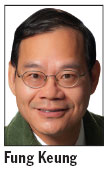Laws need to be changed to better fight money-laundering
Updated: 2013-04-26 06:18
By Fung Keung(HK Edition)
|
|||||||

The Director of Public Prosecutions' call for law reform so that dirty money can be confiscated without a criminal conviction - as is the case in many overseas jurisdictions including Australia and the United Kingdom - is worth lawmakers' support.
In 2012, government figures show, HK$772 million of assets were frozen in Hong Kong, which is really just the tip of the dirty-money iceberg since it is very difficult to successfully convict the perpetrators as the crimes are often committed in foreign countries.
In criminal trials in the city's Common Law regime, the prosecution must prove the guilt of the accused beyond reasonable doubt. Kevin Zervos, Hong Kong's director of public prosecutions, told a Hong Kong newspaper on Monday that he wants to have the option of the civil-law channel to confiscate dirty money to deter money laundering in Hong Kong. I'd urge lawmakers in the city to seriously consider and heed his call.
It is a no-brainer that drug lords in Southeast Asian countries and corrupt officials in the region use Hong Kong as a paradise to cleanse their dirty money. With the aid of high technology, complex corporate structures and professionals such as accountants and lawyers, the perpetrators' tracks often can be concealed. Civil-based confiscation would become a strong deterrent to stop drug lords and corrupt officials operating in Hong Kong.
Investigation into possible money-laundering cases in the city already has been disrupted by the "ship-jumping" of government commercial crime fighters, many of whom have been lured away by investment banks and private firms with enticing seven-figure salaries.
The loss of commercial crime investigators to the private sector partly contributed to the sharp decline of dirty money recovered and paid to the government in 2012. The amount confiscated dropped to HK$23 million, compared with HK$1.60 billion in 2011.
Experienced government investigators are required to unmask the complex corporate structures used by the money launderers to camouflage their criminal activities in the city. Unfortunately, it takes time to train commercial crime officers to attain the skills to crack the sophisticated illegal dealings of criminal syndicates.
Hong Kong plays only a small part in the worldwide money-laundering business. Last year, banking giant HSBC agreed to pay United States' authorities $1.9 billion in a settlement over money laundering, the largest paid in such a case. On March 19, 2013, the BBC reported that Argentina had alleged that HSBC used "fake receipts" to facilitate money laundering and tax evasion, and launder $77 million. The country's tax authority said it had filed criminal charges against HSBC. The bank said it would cooperate with the investigation, adding that the allegations were "of great concern".
In March 2013 in the United Kingdom, the government successfully prosecuted money launderers and put them behind bars in 14 cases. In one such case, a man who laundered over 200 million pounds ($309 million) for organized crime gangs through a London money exchange had been jailed for nine years. A Serious Organized Crime Agency investigation found the exchange had purchased over 240 million euros ($313 million) in three years from foreign-exchange sellers, but the books showed only 5 million pounds going through the corporate accounts.
In the UK, Australia and many other countries, the governments have the flexibility of proving to the court on the balance of probabilities - a lesser standard of proof - that the money involved in a suspected money-laundering case is the proceeds of a serious crime in order to confiscate it. The civil proceedings are separate from criminal charges. If such a practice is introduced in Hong Kong, it would make it easier for government departments to confiscate dirty money and deal a heavy blow to money launderers. When should lawmakers start considering a change of the existing law?
Not soon enough.
The author is coordinator of the B.S.Sc in financial journalism program at Hong Kong Baptist University.
(HK Edition 04/26/2013 page1)